Unit 1: Ledgers and Trial Balance
Key unit competence
To be able to prepare ledger accounts and trial balance.
Introduction
It’s likely that you have heard the saying, “It costs money to make money.”
A businessperson contributes money and, ideally, makes good use of it to
create even more value.
You were introduced to Accounting prime books in Senior Five unit 10, for
you to acquire the necessary skills from this unit; whenever you attempt
a question in arithmetic, you try to verify whether your answer is correct.
Similarly, an accountant also wants to be sure that the ledger accounts she
or he has prepared are correct regarding the amount, side, balance, etc. To
determine whether the debit or credit amounts recorded in the ledger are
correct, you must prepare the trial balance. This unit will teach you how toprepare ledgers and a trial balance.
Introductory Activity
In Senior 5 unit 10, you studied accounting prime books, in which you
recorded a variety of transactions carried out by various businesses as
well as those for your club activities in different prime books (Purchases
journal, Sales journal, Sales returns journal, Purchases returns journal, Cash
book and General journal). As a result, it is important to continue posting
transactions to the respective accounts for the business’s financial status
to make more sense and assist the entrepreneur in making an appropriate
decision.
Use your previous experience and accounting skills to answer the following
questions.
a) Where do you think the information from journals is posted?
b) Why is posting accounting information important in business?
c) On 1st. June.2023, John started a business with 200,000FRW, of which
100,000FRW was at the bank account.
2nd June.2023 he purchased a machine to use in his business and paid cash80,000FRW.
Required:
i) Journalize the transactions above.
ii) Post the information to the appropriate ledger.iii) Prepare a trial balance for John’s business.
1.1. Ledger
Learning Activity 1.1
The average businessperson has so many matters to attend to, and his/her
transactions are so numerous that it is impossible to remember everything
that happens chronologically in journals. Using your prior knowledge
related to transactions.
a) What is meant by a term ledger and posting?b) Show the different classifications of ledgers.
1.1.1. The meaning and types of ledgers
A ledger is a collection or a set of accounts of a business. While the
journal records all transactions chronologically, ledger accounts classify the
transactions and record those of similar nature in one account. The process
of transferring information from the books of original entry to the ledger
accounts is called posting.
For instance, all transactions related to cash movement must be recorded
together under one statement called “Cash account”,
There are several types of ledgers in accounting. In this unit, focus is put on
three types of ledgers which include:a) General ledger: is a ledger that contains all accounts of the business
except sales and purchases. E.g., assets, liabilities, incomes, expenses,
and capital.
b) A sales ledger/ Debtors ledger is a collection of all accounts of people
or businesses to whom the business has sold goods on credit (debtors).
c) Purchases ledger/Creditors ledger is collection of accounts of people
or businesses from whom the business has bought goods on credit(creditors).
Skills Lab Activity
Case study:
Mupenzi, a businessman that deals in fruits, visits an organization that
offers rural business owners small grants to expand their businesses. The
review panel conducted a short interview to gather some information
about Mupenzi’s business to determine if he qualifies.
Panel: How much have you spent on equipment and materials for your
business so far?
Mupenzi: It’s quite some amount. More than 100,000.
Panel: How much have you sold this last quarter?
Mupenzi: Business hasn’t been good because of the heavy rains. A bit
lower than last year.
After the interview, Mupenzi learnt that he did not qualify for the grant.1. Why do you think Mupenzi failed to get the grant?1.1.3. Preparation of ledgers
2. What should Mupenzi have done differently to qualify him for thegrant?
After recording accounting transactions in appropriate accounting prime
books i.e.: general journal, purchases journal, sales journal, return inwards
and return outwards journals, as well as different forms of cash books in
chronological order, the next important step is to post accounting information
from different prime books listed earlier to respective ledgers. It is in the
ledger, that all transactions of similar nature are recorded together under one
account.
The table below summarises how and what to post from prime books toledgers

A. Purchases ledger/ Creditors’ ledger
The creditors’ ledger accumulates information from the purchases journal.
The purpose of the creditors’ ledger is to provide knowledge about which
suppliers the business owes money to, and how much. This is achieved by
posting information from the purchases journal to creditors’ ledger.
Normally, every account should be balanced off at the end each month.
Balancing an account off is the adding of both the debit and credit sides
in order to make the two sides equal. When balancing off an account the
following steps are put into consideration:
Step 1: Add the two sides separately to find out the total of each
Step 2: Subtract the smaller side total from the bigger side
Step 3: Record the differences on the smaller side and call it balance carried
down (bal c/d) or balance carried forward (bal c/f) using the last date of the
month.
Step 4: Now both sides are equal.
Step 5: Put balance c/d on the opposite side (bigger side) of the account and
call it balance brought down (bal b/d) or balance brought forward (bal b/f),
using first date of the next month or period
Example 1:
Given the following Akeza’s purchases journal, post the information to the
creditors’ ledger.UNIT 1
AKEZA’S PURCHASES JOURNAL FOR THE MONTH OF MARCH 2023


Note: The total of credit purchases is debited in the purchases account
which is opened up in the general ledger.
Example 2:
Given the following Kimironko wholesalers’ purchases returns journal, post
the information to the creditors’ ledger.
KIMIRONKO WHOLESALERS’ PURCHASES RETURNS JOURNAL FOR THEMONTH OF NOVEMBER 2022

Note: The total of purchases returns is credited in the return outwards
account which opened in the general ledger.
B. Sales ledger/Debtors’ ledger
The debtors’ ledger accumulates information from the sales journal. The
purpose of the debtors’ ledger is to provide knowledge about which customer
owes money to the business, and how much. This is achieved by postinginformation from the sales journal to debtors’ ledger.
Example 3:
Given the following Alain’s sales journal, post the information to the debtors’ledger.
ALAIN’S SALES JOURNAL FOR THE MONTH OF JANUARY 2016
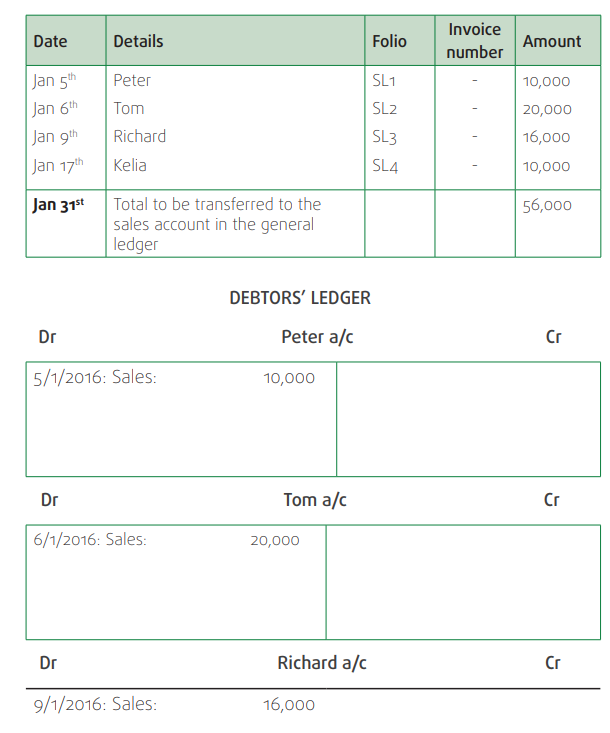
Note: The total of credit sales is credited in the sales account which
opened in the general ledger.
Example 4:
Given the following Gakuba’s sales returns journal, post the information to
the debtors’ ledger.
GAKUBA WHOLESALERS’ SALES RETURN JOURNAL FOR THE MONTH OFJANUARY 2013
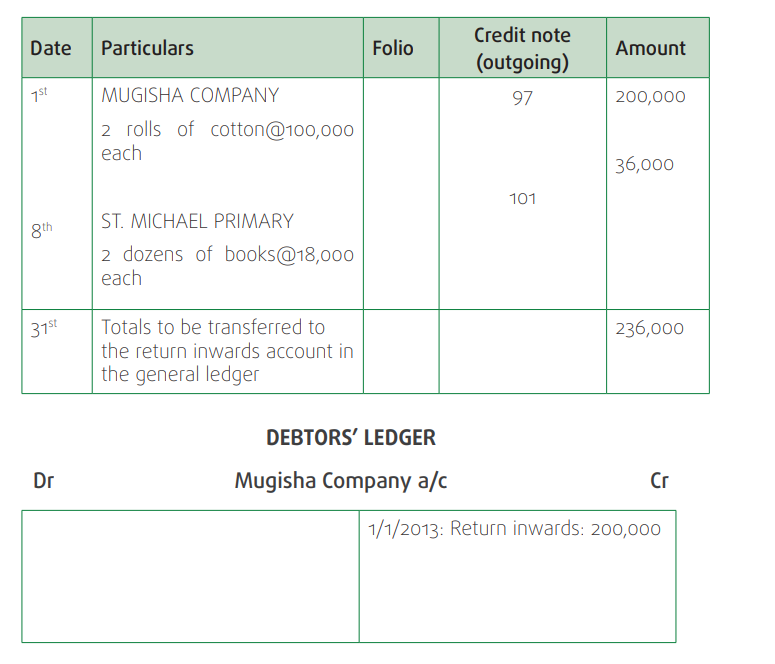
Note: The total of sales returns is debited in the return inwards account
which opened in the general ledger.
C. General ledger
The general ledger contains all other accounts that are not kept in any other
ledger e.g., buildings, furniture, and stock account.
Note: personal accounts of debtors or creditors who do not arise out of sale
or purchase of goods on credit are kept in the general ledger e.g. debtors as
a result of sale of fixed assets on credit and expenses creditors.
Let us first of all post the totals of purchases journal, purchases return journal,sales journal, and sales returns journal used above:
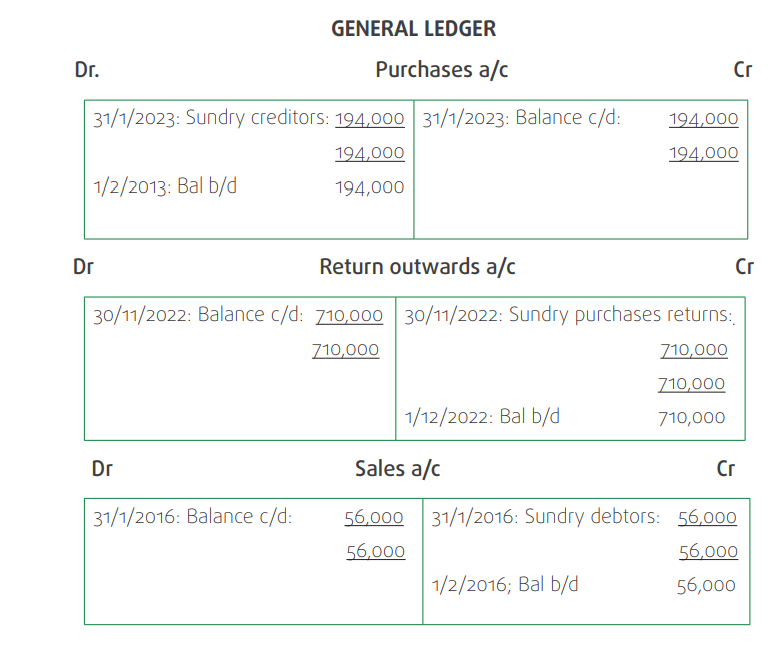
It is good time to remember that the records in the cashbook are posted to
the general ledger, creditors’ ledger, and debtors’ ledger depending on what
transaction took place.
Notes:
◾ When transactions are recorded in the cashbook, cash and bank
accounts are not opened up in the ledger. Because the recording of
transactions in the cash book takes the shape of a ledger account.
The cash book serves the purpose of a ledger account as well as a
journal for cash and bank accounts.◾ Contra entry transactions are not posted to the ledger because theirExample 5:
double entry is completed within the cashbook.
◾ Discount allowed and discount received are posted to discount
allowed account and discount received account respectively in the
general ledger
◾ While posting information from any type of cash book,
i) Details from the debit side are names of accounts to be opened
in the ledger and credited; and
ii) Details from the credit side are names of accounts to be opened
in the ledger and debited.
◾ The balance brought down (bal b/d) or balance brought forward (balb/f) is posted to the capital account in the general ledger.
Given the cash book below of Kigali Traders Ltd, post the information to the
respective ledgers. Personal accounts appearing in the cash book below are
for businesses that one-time transacted goods on credit with Kigali TradersLtd.
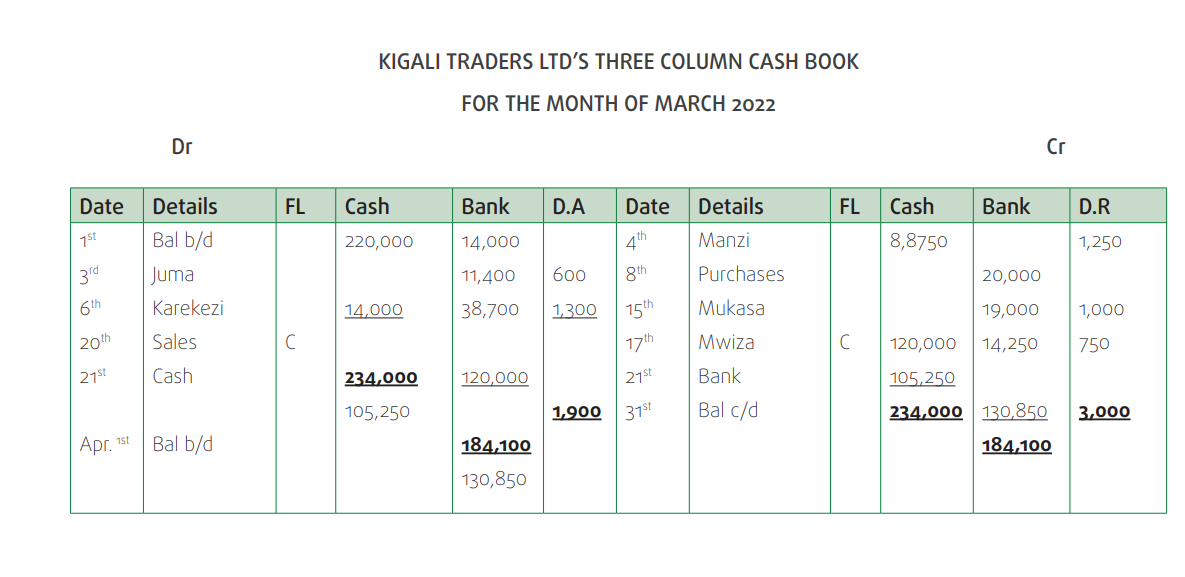
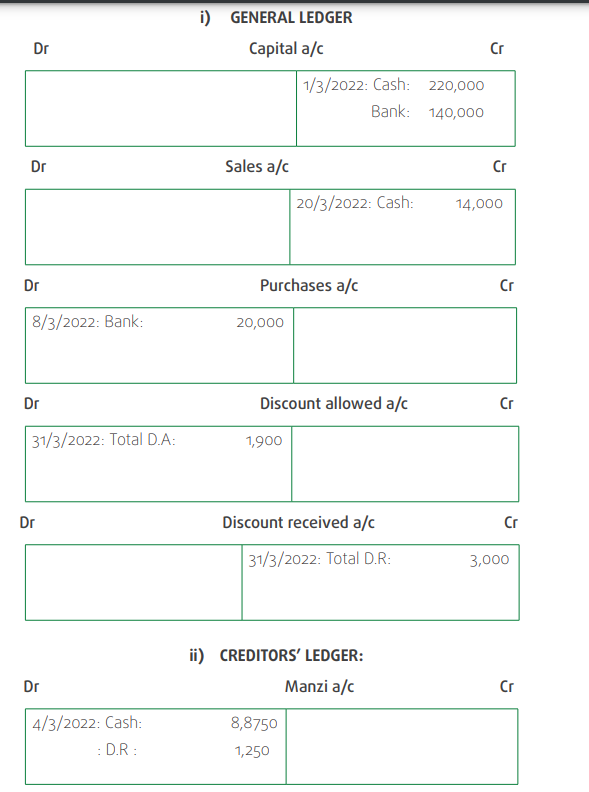
Exercise: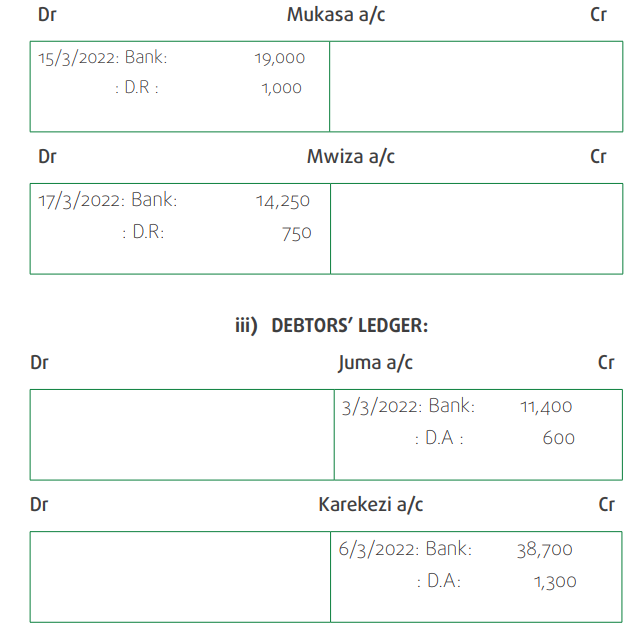
Following the clear steps of balancing accounts, balance off accounts in allthe above ledgers.
1.2 Trial Balance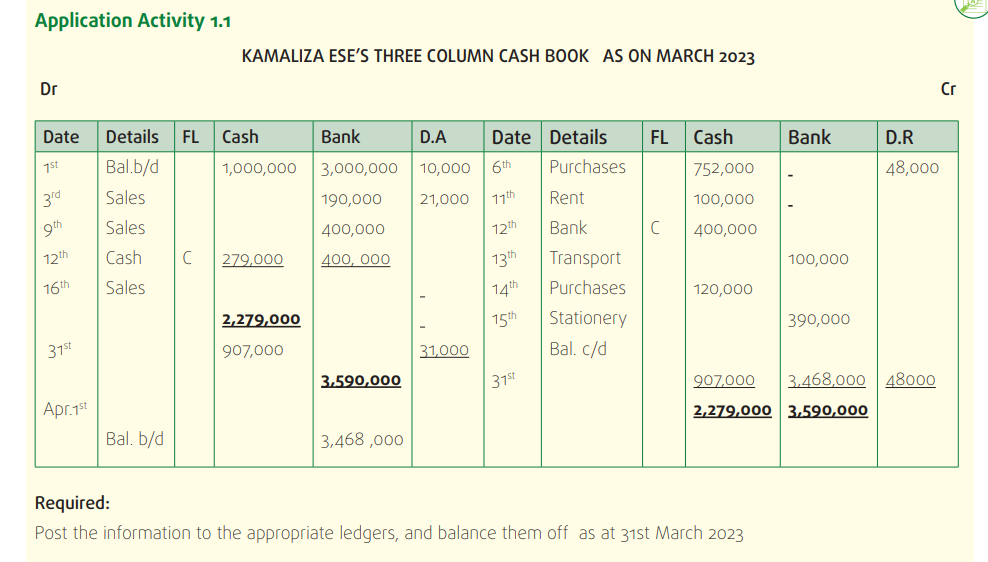
Learning Activity 1.2
1. At the end of every month, Mukamana draws a list of accounts to
check whether her records are properly recorded with arithmetical
accuracy or otherwise; she passes necessary accounting records
to correct detected errors in her books of accounts in case they
are not appropriately recorded.
i) Referring to what Mukamana does at the end of e each month,
what do we call that exercise in accounting?
ii) What do you understand by the term trial balance?
2. Do you think it is important to extract a trial balance? Justify your
answer.
1.2.1. Meaning of a trial balance
A trial balance is a list of the debit and credit balances extracted from the
ledgers at a particular date.
It is referred to as a tool to prove the arithmetical accuracy of the entries
made in the ledger. If the records have been correctly maintained based on
a double entry system, the totals of the credit and debit would be equal to
each other.
1.2.2. Importance of a trial balance
◾ It is used as proof of the arithmetical accuracy of the entries made
in the ledger.
◾ The trial balance helps to know the assets and liabilities of a business
by just looking at it.
◾ Easy preparation of final accounts to determine the profit or losses
of the business.
◾ One may rely on the results derived from the trial balance when the
total of debits equals the total of credits.
◾ Arithmetical errors made during recording and posting of transactionsare easily detected by preparing a trial balance.
1.2.3. Preparation of a trial balance
Trial Balance is not an account. It is only a list or schedule of balances of
ledger accounts. it I prepared following the steps below:
Step 1: Post all the journal entries to the appropriate ledgers.
Step 2: Balance off all ledger accounts and determine the credit or debit
balances for each ledger account.
Step 3: List all the accounts with their debit or credit balances. Ensure the
debit balances are in one column and the credit balances are in another.
Step 4: Add up all the credit balances and add up all the debit balances.
Step 5: The total of the debit balances should be equal to the total of the
credit balances. If the totals are unequal, recheck the process to identify and
correct the errors.
Note: The accounts having a debit balance are entered in the debit amount
column, and the accounts having a credit balance are entered in the credit
amount column.Format of a trial balance
Note: All expense and asset accounts normally have debit balances and are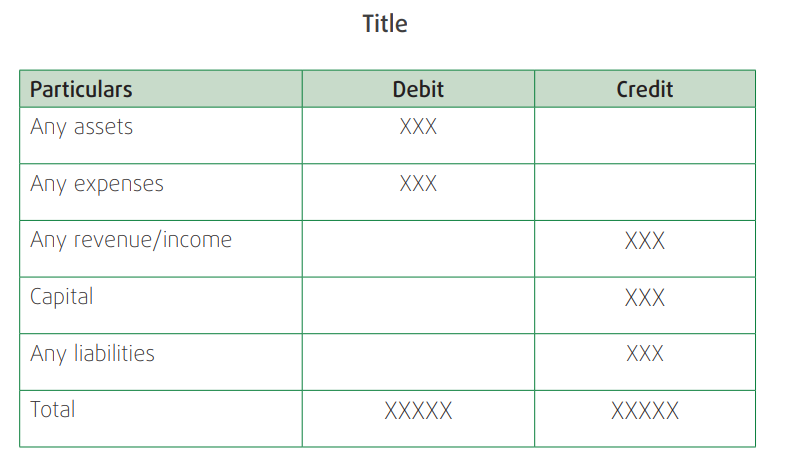
listed in the debit column, and all liability and income accounts normally have
credit balances and are listed in the credit column.
Let us use the example on page 4 to make a list of accounts of Akeza’sbusiness as at the end of March, 2023
Note: when details about opening and closing stock balances are given, the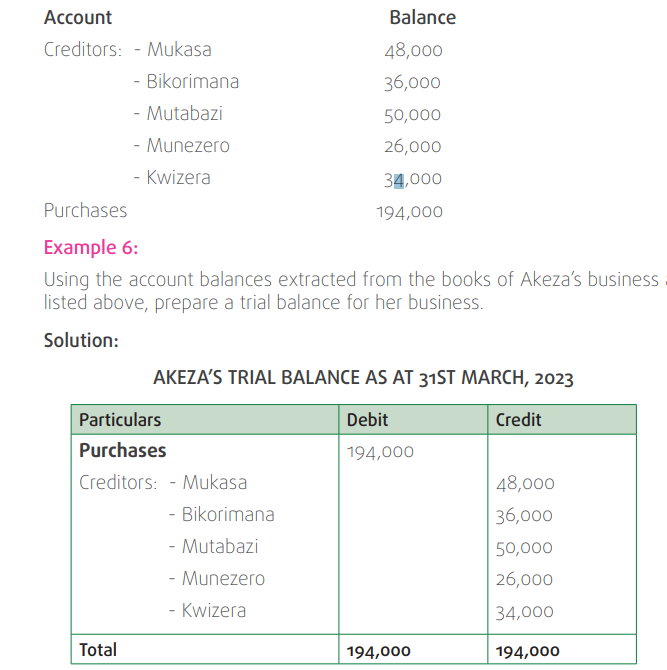
opening stock balance is used in the trial balance while the closing stock
balance is used to prepare the income statement and balance sheet.
Example 7:
The following balances were extracted from Claudine Enterprises’ books as ofDecember 2020. Extract the trial balance.

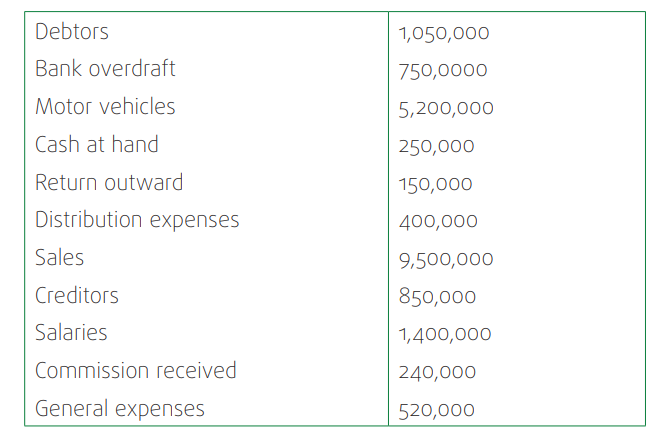
Application Activity 1.2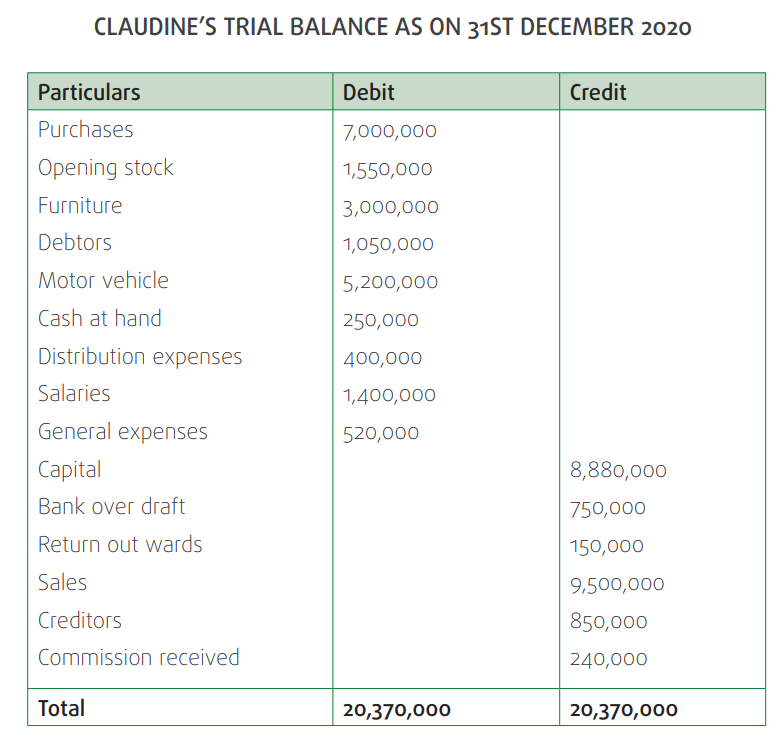
The following balances were extracted from the books of Umucyo BusinessClub as at the end of December 2020. Prepare the trial balance.
Additional information: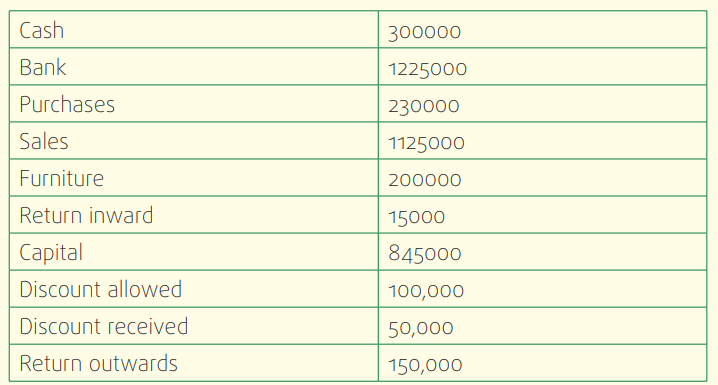
The closing stock as at 31st December 2023 was 28, 000FRW.
End of Unit Assessment
I. Project Activity
Given the following prime books extracted from XL business club’s
accounting books as at 30th November 2023, post the information torespective ledgers and there after extract a trial balance
XL BUSINESS CLUB
General journalFOR THE MONTH OF NOVEMBER 2023
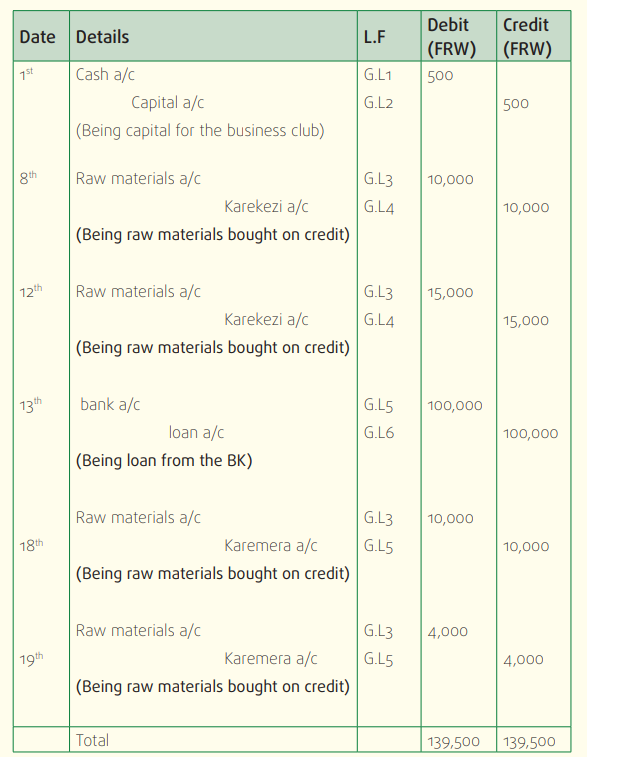
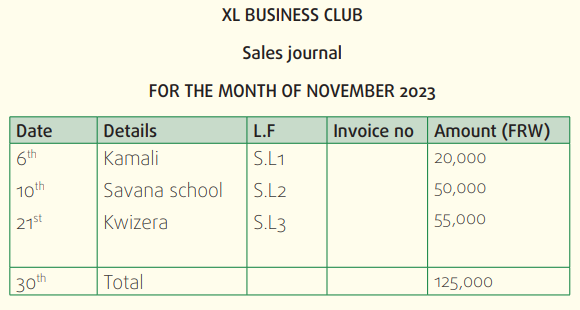
XL BUSINESS CLUB
Return inwards journal
FOR THE MONTH OF NOVEMBER 2023
2. Explain the following terms:
i) Ledger
ii) Trial balance
3. Why is important to prepare trial balance.
4. Explain the steps that are taken to prepare a Trial Balance
5. Explain the term ‘Posting’?
6. The following information was extracted from the books of Kezalimited on 31st December 2020.
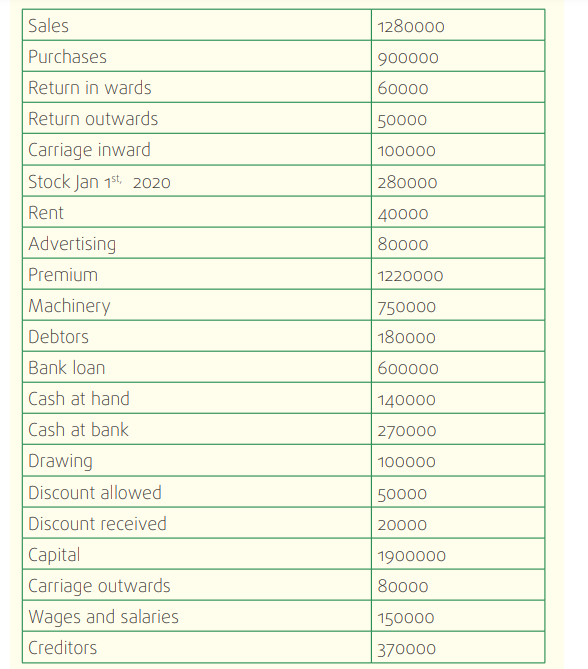
Required: Prepare the Keza limited’ trial balance as on 31st December 2020
